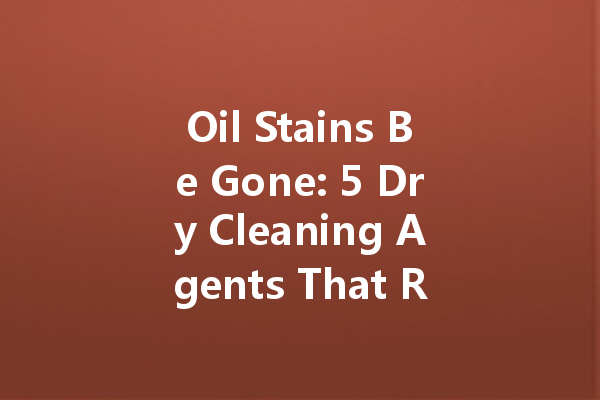Oil stains can be a nightmare, especially if they happen on your favorite clothing. Whether it’s from cooking, a car repair, or a messy meal, oil stains can seem impossible to remove. Fortunately, dry cleaning agents can come to the rescue. In this article, we’ll explore five effective dry cleaning agents that can help you tackle those stubborn oil stains and restore your clothing to its former glory.
Understanding Oil Stains
Before we delve into the various dry cleaning agents, it’s essential to understand why oil stains are so challenging to remove. Oil and grease are non-polar substances, meaning they don’t mix well with water, which makes traditional washing methods less effective. Dry cleaning uses solvents that can dissolve oil-based stains, making it a suitable solution for removing these pesky marks from fabrics.
What It Is
Perchloroethylene, commonly referred to as “perc,” is the most widely used dry cleaning solvent. It is highly effective at dissolving grease and oil stains, making it a staple in the dry cleaning industry.
How It Works
Perc penetrates fabric fibers and loosens oil molecules, allowing them to be easily washed away. This powerful solvent can be utilized on a range of fabrics, from delicate silks to sturdier cottons.
Pros and Cons
Pros:
Cons:
What It Is
Hydrocarbon solvents are petroleum-based solvents that offer a gentler cleaning option compared to perc. They are less aggressive on fabrics and are often used as an alternative to perc in dry cleaning.
How It Works
Hydrocarbon solvents break down oil and grease stains effectively while being less likely to damage delicate fabrics. This makes them a popular choice for cleaning more sensitive items, such as wool or silk.
Pros and Cons
Pros:
Cons:
What It Is
Siloxane is a newer dry cleaning agent that is gaining traction for its eco-friendliness. Made from silicone, siloxane is less harmful to the environment and is less volatile than traditional solvents.
How It Works
Siloxane penetrates fibers much like hydrocarbon solvents, lifting oil and grease without harming the fabric. Its unique structure helps it retain effectiveness in cleaning while being more environmentally friendly.
Pros and Cons

Pros:
Cons:
What It Is
Carbon dioxide is a natural substance often overlooked in dry cleaning. When liquefied, CO2 can act as a solvent, allowing it to dissolve oil stains effectively.
How It Works
Liquid CO2 functions as a gentle solvent that lifts oil stains during the cleaning process. It can be utilized in specialized dry cleaning machines designed for CO2 use.
Pros and Cons
Pros:
Cons:
What It Is
K4 is a relatively new entrant in the dry cleaning market and is marketed as an eco-friendly solution that offers excellent stain removal properties.
How It Works
K4 works by incorporating a non-toxic, biodegradable solvent that effectively detaches oil from fabric. Its gentle formulation is safe for various materials and does not harm the environment significantly.
Pros and Cons
Pros:
Cons:
Conclusion
With these five effective dry cleaning agents, you can confidently tackle oil stains on your favorite clothes. While perc is the go-to for many professionals due to its effectiveness, options like hydrocarbon solvents, siloxane, CO2, and K4 offer gentler, more eco-friendly alternatives. Always remember to check the care labels on your clothing and consult with a professional cleaner if you’re unsure about which method is best for you. Say goodbye to stubborn oil stains and enjoy your clothes looking fresh and clean again!
